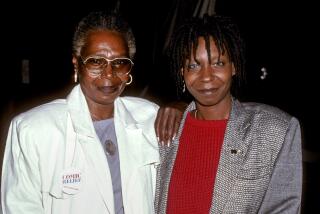Grace Lee Boggs, prominent activist for seven decades, dies at 100
If it weren’t for the rats, Grace Lee Boggs might never have become a radical.
But when she was fresh out of graduate school and working in a Chicago library for $10 a week, she had to run a gantlet of rats to get into her basement apartment. Nearby, her neighbors, mostly African Americans, faced the same problem and were out in the streets protesting.
Boggs, a pensive Chinese American scholar who was more at home in a volume of Hegel than at a street rally, joined in — and never regretted it.
She soon poured herself into other causes, other rallies. When African Americans threatened a massive march on Washington to protest discrimination at defense plants, she joined the clamor. President Franklin D. Roosevelt ended up signing an order ensuring minority access to the coveted wartime jobs.
“I found out if you mobilize a mass action, you can change the world,” she recalled decades later.
Boggs, who received a doctorate in philosophy from Bryn Mawr before marrying a black activist and becoming nationally known for her eloquent, passionate and thoughtful advocacy of social change in America, died at her Detroit home on Monday. She was 100.
Her death was announced by the James and Grace Lee Boggs Center to Nurture Community Leadership, which she established after her husband’s 1993 death.
For years, Boggs was a committed Marxist who studied the theoretical underpinnings of Communism. But the everyday struggles of African Americans soon took precedence and she became an organizer for the Black Power movement. In her later years, she championed community gardens, anti-drug programs, neighborhood activities for young people — anything that would “reinspire” the Detroit she loved.
In her 2011 book, “The Next American Revolution: Sustainable Activism for the Twenty-First Century,” she wrote that she was lucky to have taken part in historic changes:
“When I became a radical nearly 70 years ago, we ran ‘the risk of seeming ridiculous,’ as Che Guevara put it, if we thought Love had anything to do with Revolution. Being revolutionary meant being tough as nails, committed to agitating and mobilizing angry and oppressed masses to overthrow the government and seize state power by any means necessary.”
But over the years, she came to prefer a more “humanized” revolution — an approach made possible by “the modern women’s movement, which informs us that the political is personal; the ecological movement, which emphasizes loving Mother Earth … and Martin Luther King Jr.’s call for a radical revolution in our values and his concept of ‘beloved community.’”
President Obama paid tribute to Boggs in a statement this week, noting she learned early that “the world needed changing, and she overcame barriers to do just that.”
Boggs and her husband were friends with many well-known figures in the black community, including Malcolm X and Angela Davis, who once commented that Boggs had “made more contributions to the black struggle than many black people have.”
------------
FOR THE RECORD: A previous version of this article said that Grace Lee Boggs was born June 17, 1915. Her birthdate is June 27 of that year.
------------
Born June 27, 1915, in Providence, R.I., Grace Lee Boggs was the child of Chinese immigrants. Her mother, who didn’t know how to read or write, was from a village where girls were not permitted to attend school.
Boggs grew up in New York City, where her father opened a large Chinese restaurant. She graduated from Barnard College in 1935, a philosophy major entranced by the writings of Georg Wilhelm Friedrich Hegel. She later said his words, weaving through the contradictions he perceived in every truth, were like music.
As she became more intrigued with political ideas, she worked in New York with socialist theorist C.L.R. James.
In the early 1950s, she briefly lived in Los Angeles but ultimately settled in Detroit, where she wrote for a socialist newspaper and met James Boggs.
“She saw Detroit go from one of the greatest centers of wealth in the world to an international symbol of devastation and abandonment,” said University of Washington professor Scott Kurashige, co-author with Boggs of her 2011 book.
“It was a lack of wealth, a lack of jobs in Detroit that Grace saw as ... a challenge and an opportunity to reimagine what social justice would need to look like,” Kurashige said. Boggs and her husband started many local initiatives, including starting Detroit Summer, a program for young people to work on community projects.
Over the years, Boggs spoke at classes and conferences in California, including one in which she met an aspiring filmmaker also named Grace Lee.
“She was in her 80s, had this shock of white hair, and she was speaking so eloquently to these young people, myself included,” Lee said. “She was so youthful and energetic and captivating.”
When Lee asked Boggs if she could interview her for a documentary about their shared name — a common one for Asian American women — Boggs invited her to Detroit. Their interviews spanned 10 years.
Lee’s 2013 PBS documentary, “American Revolutionary: The Evolution of Grace Lee Boggs,” chronicled Boggs’ life and activism.
In 2012, Boggs and Davis shared a stage at UC Berkeley to discuss the meaning of revolution.
“We have to reimagine revolution and think not only about the change in our institutions but the changes in ourselves,” Boggstold the audience. “We are at the stage where the people in charge of the government and industry are running around like chickens with their heads cut off. And it’s up to us to reimagine alternatives and not just protest against them and expect them to do better.”
Boggs, who had no children, left no immediate survivors.
steve.chawkins@latimes.com
Staff writer Christine Mai-Duc contributed to this report.
ALSO:
Marilyn Hudson dies at 88; L.A. civic leader broke society race barriers
Rabbi Jacob Pressman dies at 95; led prominent L.A. synagogue for 35 years
Susumu Ito dies at 96; member of Japanese American regiment in World War II
More to Read
Start your day right
Sign up for Essential California for the L.A. Times biggest news, features and recommendations in your inbox six days a week.
You may occasionally receive promotional content from the Los Angeles Times.







